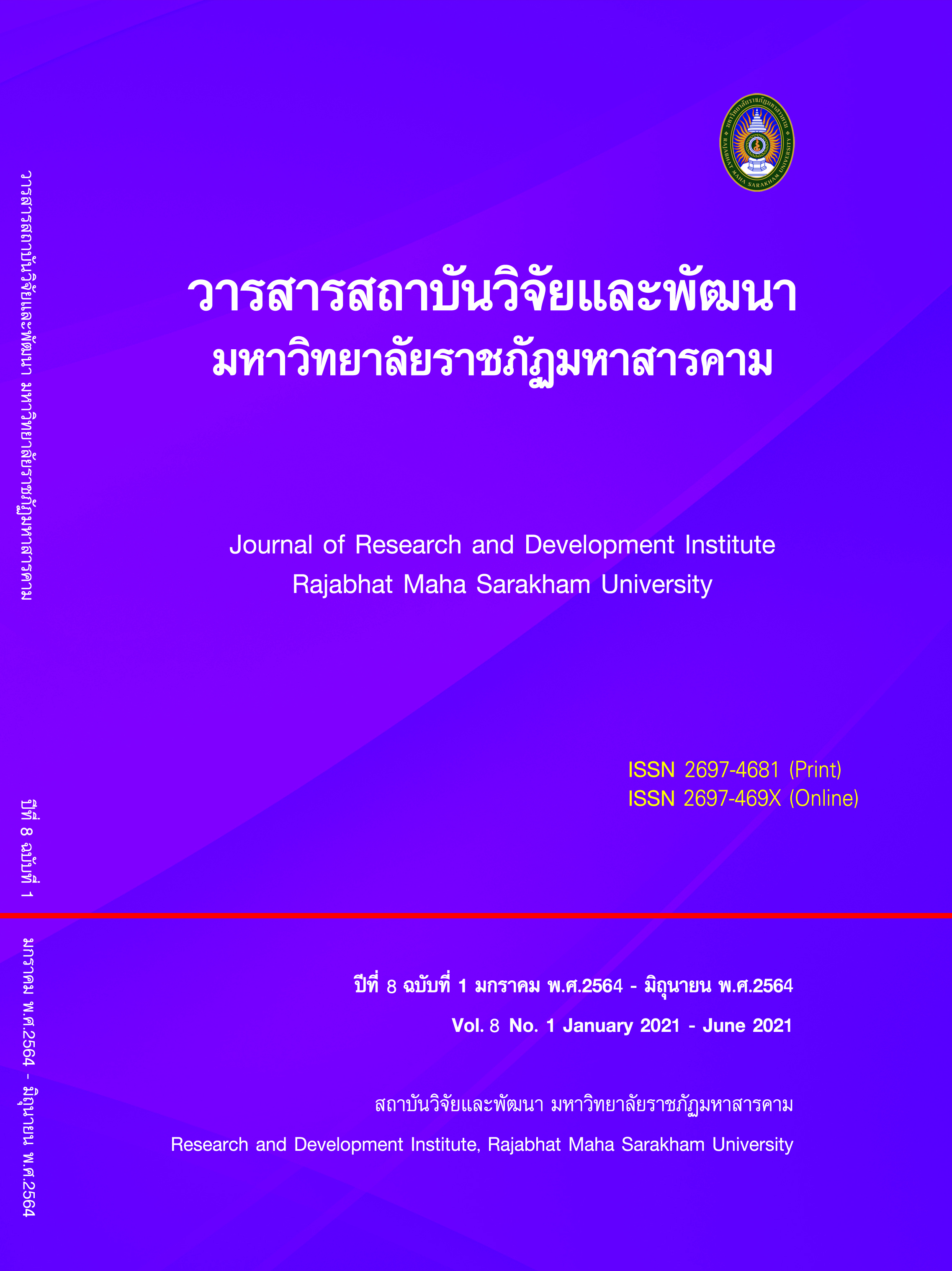The Development of Desirable Characteristics on Public Mind for Kindergarteners under the Office of Mahasarakham Primary Education Service Area 1
Keywords:
Public mind, Kindergarten, Desirable characteristicsAbstract
The purposes of this research were to study the current state and develop the desirable characteristics on public mind for kindergarteners under the Office of Mahasarakham Primary Education Service Area 1. The research procedures were divided into two phrases. The first stage was to study the current state of the desirable characteristics on public mind for kindergarteners, with 229 samples. The research instrument was a questionnaire. The second stage was the studying of the development of the desirable characteristics on public mind for kindergarteners, with 9 experts by using the formal interview .
The results found that:
- The current state of the desirable characteristics on public mind for kindergarteners in overall was moderate by raking from maximum to minimum average following 1) supporting 2) cooperation 3) common interest and 4) sharing respectively.
- The development of the desirable characteristics on public mind for kindergarteners under the Office of Mahasarakham Primary Education Service Area 1 comprised of 1) activities supported the development of kindergartener’s public mind 2) curriculum for development of kindergartener’s public mind or learning sets and 3) the good model of being public mind from the administrators, teachers and parents.
References
Bierhoff. (2002). Prosocial Behavior. Psychology Press. New York.
Charoenwongsak, K. (2013). Creative thinking. Bangkok: Success Media.
Khamanee, T. (2007). Moral, Ethics and Values Development: from theory to practice. Bangkok: Methitips Co., Ltd.
Kraivixien, T. (2009). Ethics and Ethics of Executives. Bangkok: Office of the Civil Service Commission.
Krejcie, R. V. & Morgan, D. W. (1970). Determining Sample Size for Research Activities. Educational and Psychological Measurement.
Maesincee, S. (2007). The world has transformed security in a new definition. Bangkok: Siam M&B Fold.
Miller, Darla Ferris. (2000). Positive Child Guidance. (3rd ed). New York: Thomson Learning.
Ministry of Education. (2018). The guide to building a network for joint development and promotion of learning potential. Bangkok: Office of the Basic Education Commission.
National Early Childhood Development Board. (2017). National Child Development Center Standards. Bangkok: Bureau of Educational Standards and Learning Development Education Council Secretariat Ministry of Education.
Office of the Basic Education Commission. (2010). Guidelines for implementing basic educational standards. Bangkok: Aksorn Charoenthat.
Office of the National Economic and Social Development Board. (2017). National Economic and Social Development Plan No. 12 (2017-2021). Bangkok: Office of the National Economic and Social Development Board.
Panich, W. (2009). Organization of learning and knowledge management. Bangkok: Office of the Research Fund.
Phetchabun, S. (2014). Educational management strategies to develop learners to have desirable characteristics, case studies of Horwang School Under the Office of Secondary Education Service Area, Region 2. Report on the development of curriculum for development of high-level executives. Nakhon Pathom: Teacher Development Institute, Faculty and educational personnel.
Prueksawan, P. (2011). A study of the composition and development of the public mind of early childhood children with a teaching style. Master’s Thesis: Srinakharinwirot University.
Schnotz, W. (1994). Reading Comprehension, Learning of. The International Encyclopedia of Education. (2nded). Grant Britain: BPC Wheatons Ltd, Exeter.
Suthirat, C. (2009). 80 innovations in learning management with a student-centered focus. Bangkok: Danex Inter Corporation.
Suthirat, C. (2012). Teaching children to have a public mind. (5nded). Bangkok: We Print
Takonthong, N. (2007). Public mind, desirable characteristics of Thai children. [Online]. http://www.ireo.bu.ac.th/moral.doc. [15 April 2019]
Thammakul, D. (2014). Follow the steps.....go to the health hospital. Workshop “Developing Health Builders of Hospitals” (2nded). Nonthaburi: Boromarajonani College of Nursing.
Thanawutthikul, S. (2012). Strategies for Developing Public Mind of Students in Primary Education Institutions. Master’s Thesis: Naresuan University.
Yimwilai, C. (2007). Public consciousness. Weekend Matichon. 27(1393): June 15.
Yukanaraya. (2010). Reform Thailand. Bangkok: Wai Lai.
Yuvabadhana Foundation. (2018). Moral School Development Project 2018. Bangkok: Yuvabadhana Foundation.
Downloads
Published
How to Cite
Issue
Section
License
Copyright (c) 2021 Journal of Research and Development Institute Rajabhat Maha Sarakham University

This work is licensed under a Creative Commons Attribution-NonCommercial-NoDerivatives 4.0 International License.
Articles that are published are copyrighted by the authors of the articles







